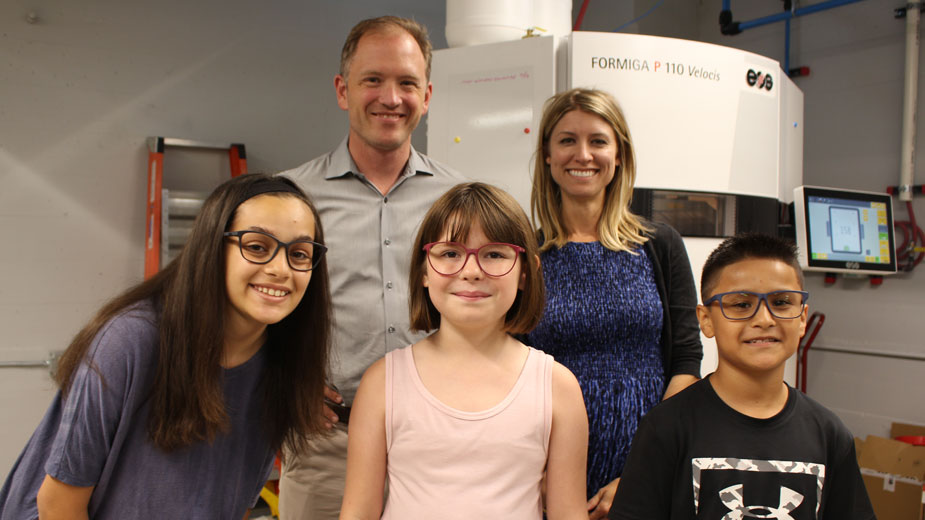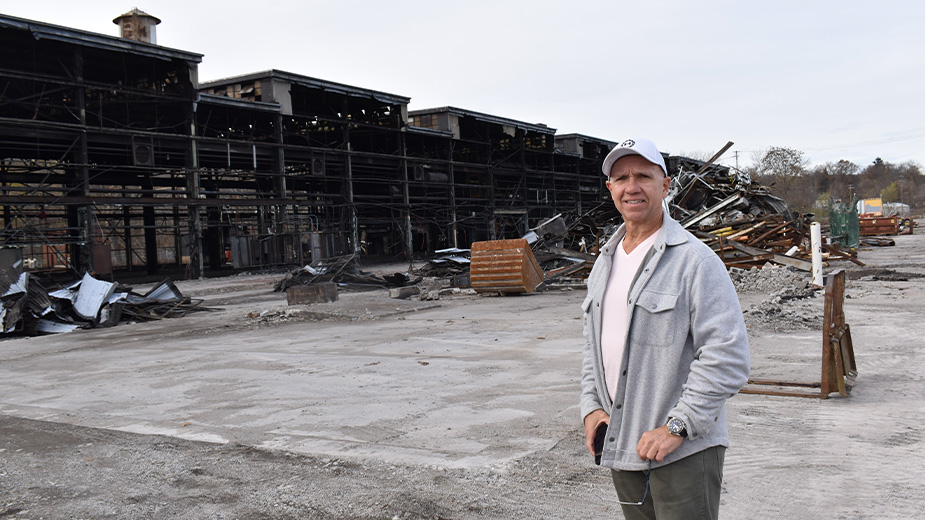Fitz Frames Delivers First Glasses to Area Kids
YOUNGSTOWN, Ohio – Emalie Esmail, Kasey Kelly and Maximo Fred are the first kids on the block – indeed, the entire Mahoning Valley – to own a pair of Fitz Frames eyeglasses.
The company, which manufactures children’s eyeglass frames through 3D printing, delivered its first three frames to local customers less than two weeks after announcing its new operation at the Youngstown Business Incubator’s Tech Block Building No. 5.
“I thought they were really cool, especially how they’re made,” Emalie Esmail said of her new gray eyewear – a pair she selected from a companion app designed by Fitz Frames. “They made the app so you can choose the style and you can try them on” through a virtual process.
Fitz Frames, based in Los Angeles, announced July 7 that it would be manufacturing its eyeglass frames from the YBI.
Heidi Hertel, founder of the company, said the idea for the business came from her own experience consistently replacing eyewear for her kids. “I found out the every time it was time to shop for glasses, it was really a disappointing experience,” she said. “We just couldn’t find what we needed.”
Hertel’s solution was to manufacture eyeglass frames that provide the perfect fit for the customer at a reasonable price. “When you shop for glasses, you end up compromising on one of four things: the fit, the style, the size or the price,” she said. “I wanted to come up with a solution that would be easy to shop for glasses, fun for parents and kids, and have a more accurate fit.”
Instead of traditional hinges that connect the temples with the rims, Fitz Frames has designed a ball and socket joint that kids can replace on their own.
There are about 5,400 on the waiting list for the company’s glasses, she said. “It’s been a great response.”
Hertel acknowledged that she didn’t know much about 3D printing before she came to Youngstown. “Additive manufacturing has been a godsend,” she said. “It was important for us to make the product in the U.S. and this is the only way we could do it.”
She noted Youngstown and the YBI were a perfect fit because of their dedication and expertise with additive manufacturing. Their lens supplier, Classic Optical Laboratories in Liberty Township, first made Hertel aware of the YBI and Youngstown. Classic Optical provides lenses for Vision to Learn, a California nonprofit that provides free eye exams and glasses to children. Hertel is on the organization’s advisory board.
“We lucked into Youngstown,” said co-CEO Gabriel Schlumberger.
The company hosted an open house and tour of the operations on Wednesday, showcasing the first customers in the Mahoning Valley. It was the first public look at Fitz Frames’ additive manufacturing operation, now underway on the building’s ground floor. Two 3D printing machines are presently being used, while there are plans to add more, he said.
“We’re fully making glasses now at launch capacity,” he said.
While 3D printing is typically used for prototyping, it is rarely used for actual manufacturing, especially in large quantities, Schlumberger says. However, Fitz Frames believes it has the right business model to balance customization and volume.
“There are no two frames alike,” Schlumberger said.
Customers are able to use the company’s app to select the type of frame and color they desire. At the same time, the app uses facial mapping technology to digitally create a pair of eyeglass frames that are specifically fitted for the individual. Orders are made through the app.
The glasses are made of nylon polymer material and are more durable than traditional frames, he said. The digital file from the app is transmitted to the Youngstown operation where the information is fed into a 3D printer. The printer reads the build file and then creates the rough frames with the nylon polymer material through a sintering process.
Eyeglass frames are then finished at several stations, the first of which is a blasting process that uses glass beads to clean off any excess dust or material off the frame. They are then placed into a “vibra-tumbler” – a vibrating cauldron that is filled with what looks like small white pebbles. This process helps smooth out the frames.
The frames are then placed into a second tumbler and churned for several hours in order to polish them. The frames are then transported to a dye machine, which adds color to the product.
“We have seven different colors and white,” Schlumberger said.
Additive manufacturing technology, as well as mobile app technology, have matured to a point where this business model is viable, Schlumberger said.
“You couldn’t have built this company even two years ago,” he said. “And we wouldn’t be here if it wasn’t for Youngstown and the YBI.”
Pictured: Fitz Frames co-CEO Gabriel Schlumberger and founder Heidi Hertel delivered the company’s first 3D printed glasses to local kids Emalie Esmail, Kasey Kelly and Maximo Fred.
Copyright 2024 The Business Journal, Youngstown, Ohio.



